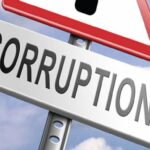Corruption is one of the biggest problems holding Nigeria back. From misuse of public funds to bribery and favoritism, it affects almost every part of our society. If we don’t tackle this issue seriously, our country’s progress will remain slow, and its potential will not be fulfilled.
Corruption drains resources meant to improve our lives. Money that should be used to build schools, hospitals, and roads often ends up in private hands. As a result, children sit on bare floors to learn, patients are left without proper medical care, and roads become death traps due to neglect.
It also discourages investors, both local and international, from starting or growing businesses in Nigeria. When bribes and shady deals are required to get things done, businesses suffer. This leads to fewer job opportunities and more poverty, making life harder for everyday Nigerians.
The fight against corruption starts with leadership. Our leaders must set an example by being honest and fair in how they manage public resources. Sadly, many prioritise their personal gain over the welfare of the people, creating a system where corruption thrives.
- National grid collapse: Nigeria’s recurring nightmare
- Nigeria doesn’t Need Kemi Badenoch, and here’s why
Anti-corruption agencies like the EFCC (Economic and Financial Crimes Commission) and ICPC (Independent Corrupt Practices Commission) need to be empowered. They should be independent and provided with enough resources to catch and punish those who steal from the public.
Our courts must also do their part by ensuring that corruption cases are resolved quickly. When cases drag on for years, it gives room for the guilty to escape punishment. Justice delayed is justice denied.
Transparency in government is vital. Officials should publicly declare their assets when they take office and when they leave. Citizens should have easy access to information about how public funds are spent to ensure accountability.
Educating the public about the dangers of corruption is key. When people understand how corruption affects their daily lives, they are more likely to reject it and demand better leadership. Schools should teach children the value of honesty and the harm caused by dishonest practices.
Ordinary Nigerians also play a role in this fight. We must refuse to pay bribes and report unethical behaviour whenever we see it. Holding leaders accountable starts with the people standing up for what is right.
Technology can help reduce corruption. For instance, using online systems to pay taxes or apply for government services can limit human contact, which often leads to bribery. Tracking government spending through digital platforms ensures public funds are used properly.
Consequences matter. If people know they will face serious punishment for corrupt actions, they will think twice. No one should be above the law, and all offenders should face the same justice, no matter their positions.
The media is a powerful weapon against corruption. Journalists should investigate and expose corrupt activities, keeping the public informed. However, they must be protected from threats and harm for doing their job.
We can also learn from other countries that have successfully reduced corruption. Partnering with international organisations to recover stolen funds and enforce anti-money laundering rules will strengthen our efforts.
Our religious and cultural leaders must also take a stand. They can use their influence to promote honesty and accountability in our communities, encouraging followers to do the right thing.
Corruption impacts every Nigerian, from the farmer in the village to the businessperson in the city. It worsens inequality and destroys trust in the government. If left unchecked, it could divide the nation further and create even more resentment among its people.
This battle is not just for the government to fight; it requires the active participation of all Nigerians. By coming together, we can break the chains of corruption and create a brighter future for our country.
Our leaders must take this responsibility seriously. Empty promises will only increase frustration among the people. Anti-corruption measures must be consistent and effective to bring a lasting change.
Nigeria is rich in resources and talent. With strong leadership and the collective will of its citizens, it can overcome corruption and unlock its full potential. The future is bright if we all play our part in this fight. Let us act now to end corruption and build a country where everyone can thrive. The journey may be tough, but the reward is worth it.
Paul Alimu Maunta, Department of Mass Communication, Borno State University, Maiduguri.

 Join Daily Trust WhatsApp Community For Quick Access To News and Happenings Around You.
Join Daily Trust WhatsApp Community For Quick Access To News and Happenings Around You.